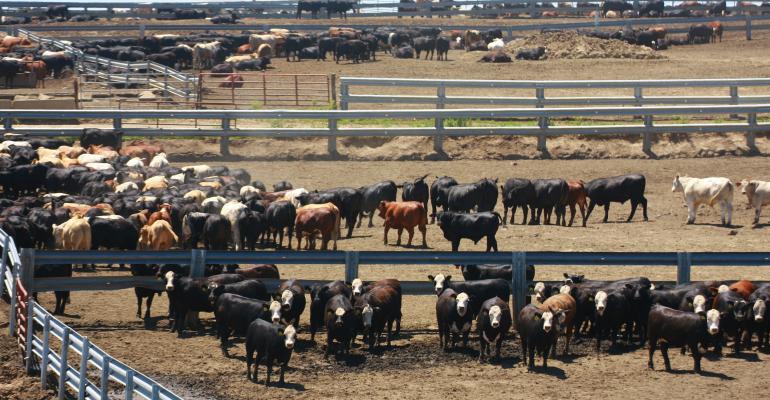R-CALF USA files federal class action lawsuit against beef packers
Tyson, JBS, Cargill, National Beef and certain affiliates named in lawsuit.

Scott+Scott Attorneys at Law LLP (Scott+Scott), a national antitrust and securities litigation firm, along with Cafferty Clobes Meriwether & Sprengel LLP (Cafferty Clobes), have filed a class action lawsuit in federal district court in Chicago, Ill., on behalf of R-CALF USA and four cattle feeding ranchers from Iowa, Nebraska, Kansas and Wyoming. The suit alleges that the nation's four largest beef packers violated U.S. antitrust laws, the Packers & Stockyards Act and the Commodity Exchange Act by unlawfully depressing the prices paid to American ranchers.
The complaint was filed against Tyson Foods Inc., JBS S.A., Cargill Inc. and National Beef Packing Co. LLC and certain of their affiliates (the Big 4), which collectively purchase and process more than 80% of the fed cattle in the U.S. annually. The suit alleges that from at least Jan. 1, 2015, through the present, the Big 4 packers conspired to depress the price of fed cattle they purchased from American ranchers, thereby inflating their own margins and profits.
The class action lawsuit seeks to recover the losses suffered by two classes believed to be harmed by the Big 4's alleged conduct. The first class includes cattle producers who sold fed cattle to any one of the Big 4 from January 2015 to the present. The second class consists of traders who transacted live cattle futures or options contracts on the Chicago Mercantile Exchange (CME) from January 2015 to the present. The complaint, which is supported by witness accounts, including a former employee of one of the Big 4, as well as trade records and economic evidence, alleges that the Big 4 conspired to artificially depress fed cattle prices through various means, including:
Collectively reducing their slaughter volumes and purchases of cattle sold on the cash market in order to create a glut of slaughter-weight fed cattle;
Manipulating the cash cattle trade to reduce price competition among themselves, including by enforcing an antiquated queuing convention through threats of boycott and agreeing to conduct substantially all of their weekly cash market purchases during a narrow, 30-minute window on Fridays;
Transporting cattle over uneconomically long distances, including from Canada and Mexico, in order to depress U.S. fed cattle prices, and
Deliberating closing slaughter plants to ensure the underutilization of available U.S. beef packing capacity.
These alleged practices are estimated to have depressed fed cattle prices by an average of 7.9% since January 2015, thus causing significant harm to U.S. ranchers.
"R-CALF USA is taking this historic action to fulfill its promise to its members to prevent the Big 4 packers from capturing the U.S. cattle market from independent U.S. cattle producers," R-CALF USA chief executive officer Bill Bullard said, adding that the group has "exhausted all other remedies, but now, with the expert help of Scott+Scott and Cafferty Clobes, our members' concerns will be addressed, and we hope U.S. cattle ranchers can be compensated for years of significant losses."
David Scott, managing partner at Scott+Scott, said, "The impact of the packers' conduct on American cattle ranchers has been catastrophic. The health and integrity of the American cattle industry is being permanently and irrevocably damaged, independent ranchers are systematically being driven out of business and consumers are losing the ability to buy high-quality American beef with confidence."
Cafferty Clobes partner Anthony Fata said the packers' alleged conduct has had a direct and significant impact on the commodities underlying CME live cattle futures and options contracts and added, "It is imperative for investors to maintain confidence in this vital financial market, relied upon by ranchers, traders and others to manage the risks associated with their businesses."
In a statement to Feedstuffs, Tyson Foods expressed disappointment in the “baseless case” that was filed.
“As with similar lawsuits concerning chicken and pork, there’s simply no merit to the allegations that Tyson colluded with competitors,” the company said. “This complaint is nothing more than another transparent and opportunistic attempt by attorneys to make money for themselves at the expense of consumers.”
Tyson continued, “Tyson operates with integrity every day. We welcome competition, which makes us a better company, enhances the quality of our products and provides more choices at greater value to our customers.”
Further, the company said it depends on thousands of independent cattle, pig and chicken farmers and ranchers as a vital part of its supply chain, noting, “Contrary to the assertions in this lawsuit, Tyson wants its suppliers to succeed.”
The company said it will “vigorously defend” itself and its proud heritage of supporting America’s farmers and ranchers.
About the Author(s)
You May Also Like





